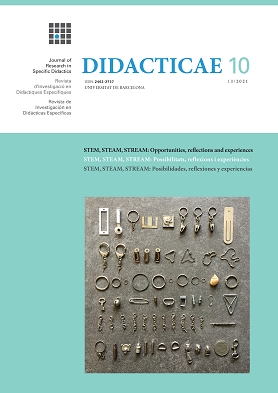Educación STEAM en educación infantil: Un acercamiento a la ingeniería
STEAM education in early childhood education: An approach to engineering
DOI:
https://doi.org/10.1344/did.2021.10.37-54Keywords:
STEAM, mathematical competence, early chilhood education., process standards, problem resolutionAbstract
In this work we propose the convenience of developing the competences related to STEAM Education using rich contexts that favour learning. In particular, we show how the use of problems related to engineering, adapted to the ages of children in Infant education (4 and 5 years old), and raised from the approach of Realistic Mathematics Education, favours the development, among other things, of mathematical competence, allowing to work not only on the content standards but also on the standards of mathematical processes, which results in more significant learning.
References
Alsina, A. (2009). El aprendizaje realista: una contribución de la investigación en Educación Matemática a la formación del profesorado. En M. J. González, M. T. González y J. Murillo (Eds.), Investigación Matemática XIII (pp. 119-127). SEIEM.
Alsina, A. (2011). Educación matemática en contexto: de 3 a 6 años. Cuadernos de Educación.
Alsina, A. (2014). Procesos matemáticos en Educación Infantil: 50 ideas clave. Revista Números, Revista de Didáctica de las Matemáticas, 86, 5-28. http://www.sinewton.org/numeros/numeros/86/Articulos_01.pdf
Alsina, A. (2020). Conexiones matemáticas a través de actividades STEAM en Educación Infantil. Unión 58, 168-190. https://union.fespm.es/index.php/UNION/article/view/69
Alsina, A. y Acosta, Y. (2018). Iniciación al álgebra en educación infantil a través del pensamiento computacional: una experiencia sobre patrones con robots educativos programables. Unión, 52, 218-236. http://www.fisem.org/www/union/revistas/2018/52/10.pdf
Alsina, A. y Coronata, C. (2014). Los procesos matemáticos en las prácticas docentes: diseño, construcción y validación de un instrumento de evaluación. Edma 0-6: Educación Matemática en la Infancia, 3(2), 23-36. http://www.edma0-6.es/index.php/edma0-6/article/view/129
Alsina, A. y Salgado, M. (2018). Land Art Math: una actividad STEAM para fomentar la competencia matemática en Educación Infantil. Edma 0-6: Educación Matemática en la Infancia, 7(1), 1-11. http://www.edma0-6.es/index.php/edma0-6/article/view/48
Berciano, A., Jiménez-Gestal, C. y Salgado Somoza, M. (2016). Tratamiento de la orientación en el aula de Educación Infantil desde la perspectiva de la Educación Matemática Realista. Revista Números, 93, 31-44. http://www.sinewton.org/numeros/numeros/93/Articulos_03.pdf
Botero, J. (2018). STEM. Introducción a una nueva forma de enseñar y aprender.STEM Educación Colombia.
Bowman, B. T., Donovan, M. S. y Burns, M. S. (Eds.) (2001). Eager to learn: Educating our preschoolers. National Academy Press.
Canals, M.A. (2010). Problemas y más problemas. Ed. Associació de Mestres Rosa Sensat.
Cardona, M., Arias, V., Trujillo, C. y Carmona-Mesa, J. A. (2020). Divulgación de la ingeniería en estudiantes de secundaria por medio del diseño ingenieril y la educación Maker, una experiencia de campamento bajo el enfoque de educación STEAM. En E. Serna (Ed.), Revolución en la formación y la capacitación para el siglo XXI, Vol. II (pp. 264–277). Editorial Instituto Antioqueño de Investigación. http://doi.org/10.5281/zenodo.4266566
Copple, C. y Bredekamp, S. (2009). Developmentally appropriate practice in early childhood programs serving children birth through age 8. NAEYC.
Couso, D. (2017). Per a que estem a STEM? Un intent de definer l'alfabetització STEM per a tothom i amb valors. Ciències, 34, 22-30. https://doi.org/10.5565/rev/ciencies.403
Freudenthal, H. (1991). Revisiting mathematics education. China Lectures. Kluwer Academic Publishers.
Jiménez-Gestal, C., Berciano, A. y Salgado, M. (2019). Cómo trabajar la orientación espacial de modo significativo en Educación Inantil: implicaciones didácticas. Revista de Educación Matemática, 31(2),61-74. http://doi.org/10.24844/EM3102.03
Kilpatrick, J., Swafford, J. y Findell, B. (2001. Adding it up: Helping children learn Mathematics. National Academy Press.
LOE (2006). Ley Orgánica 2/2006 de 3 de mayo de Educación. MEC.
National Association for the Education of Young Children and National Council for Teachers of Mathematics (2013). Early childhood mathematics: Promoting good beginnings. A joint position statement. Edma 0-6: Educación Matemática en la Infancia, 2(1), 1-23. http://www.edma0-6.es/index.php/edma0-6/article/view/108
National Council of Teachers of Mathematics. [NCTM] (2000). Principles and standards for school mathematics. Reston: National Council of Teachers of Mathematics (Trad. Castellana, Principios y estándares para la educación matemática. Sociedad Andaluza de Educación Matemática Thales, 2003).
Novo, M.L., Alsina, A., Marbán, J.M. y Berciano, A. (2017). Inteligencia conectiva para la educación matemática infantil. Revista Comunicar, 52, 29-39. https://doi.org/10.3916/C52-2017-03
Polya, G. (1965). Cómo plantear y resolver problemas. Editorial Trillas.
Salgado, M., Jiménez-Gestal, C. y Berciano, A. (2020). Tipos de consensos y estrategias de reparto en pequeños grupos en 4 años: “Operación Lacasitos”. Edma 0-6: Educación Matemática en la Infancia, 9(1), 1-11. http://www.edma0-6.es/index.php/edma0-6/article/view/90
Sarama, J., Clements, D., Nielsen, N., Blanton, M., Romance, N., Hoover, M., Staudt, C., Baroody, A., McWayne, C. y McCulloch, C., (2018). Considerations for STEM education from PreK through grade 3. Education Development Center, Inc. https://www.edc.org/considerations-stem-education-prek-through-grade-3
Zollman, A. (2012). Learning for STEM literacy: STEM literacy for learning. School Science and Mathematics, 112(1), 12-19. https://doi.org/10.1111/j.1949-8594.2012.00101.x
Downloads
Published
Issue
Section
License
Copyright (c) 2021 Ainhoa Berciano Alcaraz, Clara Jiménez-Gestal, María Salgado Somoza

This work is licensed under a Creative Commons Attribution-ShareAlike 4.0 International License.
The authors who publish in this journal agree to the following terms:
- Authors retain copyright and grant the journal the right of first publication.
- Submitting a paper does not involve paying any fees.
- Texts will be published under a Creative Commons Attribution Share-Alike 4.0 International License that allows others to share the work, provided they include an acknowledgement of the work’s authorship, its initial publication in this journal and the terms of the license.
- When citing works published in Didacticae, both the autor and the journal must be cited.
- Didacticae does not accept any responsibility for the points of view and statements made by the authors.



